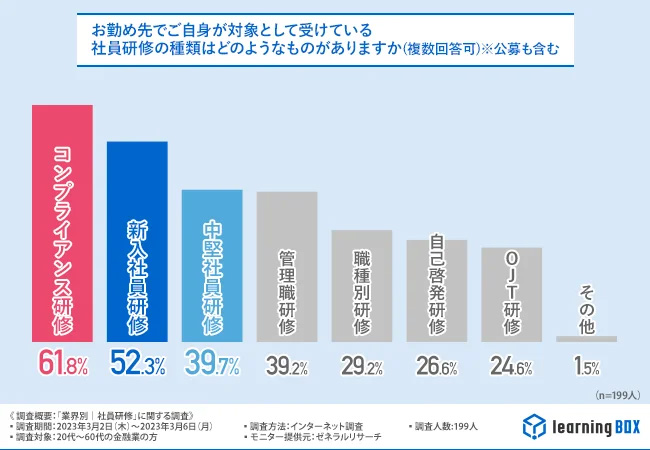
LearningBOX Inc. conducted a survey on "Employee Training by Industry" among those in the financial industry in their 20s to 60s.
Of the results of the survey, which covered a total of five industries*, we are pleased to announce the results for the financial industry.
*5 industries in total: medical care, finance, retail, manufacturing, and local government.
Survey Results Topics
Compliance training" was the most common type of employee training received, with the financial industry topping the list among the five industries.
0Challenges in how to reflect "designing education and training tailored to employee level".
<Survey Summary
1. survey method: web-based questionnaire using monitors from General Research Corporation
2. survey target: financial industry professionals in their 20s to 60s among General Research's registered monitors.
3. number of valid responses: 199
4. survey dates: March 2, 2023 (Thursday) to March 6, 2023 (Monday)
<Results of the survey of other industries
Medical Care:https://learningbox.co.jp/news/medical_care_report/
Compliance is the most common type of employee training received in the financial industry, with the financial industry leading among the five industries in the percentage of employees receiving compliance training.
A survey of 199 people in the financial industry was conducted.
When asked in what format they conduct employee training, "online (15.6%)," "face-to-face (24.6%)," and "both online and face-to-face (59.8%)" were the most common.

Next, what type of employee training do you receive? (When asked (*including open recruitment), the most common response was "Compliance training (61.8%)," followed by "New employee training (52.3%)" and "Mid-level employee training (39.7%).
Of the industries surveyed (medical care, financial, retail, manufacturing, and municipal), only the financial industry had the highest number of compliance training programs.
Although the training programs unique to the industry are seen as distinctive, opinions on the content of the training programs do not differ much from those of other industries.
About 70% (71.4%) feel that the content of employee training is being applied to their work, but about 80% (81.5%) think that the content of employee training needs to be changed every year, indicating that although they are applying the training content to their work, it is not yet the kind of training content they are seeking.
Furthermore, when asked about their level of satisfaction with the current employee training, approximately 40% (40.7%) were not satisfied, indicating that many feel that the training content is not what they are looking for as described above.
On the other hand, we also asked the respondents what aspects of their current employee training they are satisfied with.
Some excerpts of its contents are,
The self-development training by an outside instructor was helpful not only for work but also as a way of thinking about life (20s / Iwate).
・Because there are many new discoveries, such as training for management-level candidates (40s/Tokyo)
When I feel that I have learned something by remembering it after a long time has passed (50s / Osaka)
Having time to consider a single issue outside of work (60s / Hokkaido).
They seem to be satisfied with this point.
The most common issue with employee training in the financial industry is "forgetting the content of employee education and training after some time" at 50.8%.
When asked what problems they felt about employee training, the most common response was "I forget the content of employee education and training after a while (50.8%)," followed by "I cannot acquire sufficient knowledge and skills (36.2%)" and "There is no place to use the knowledge and skills I have acquired (36.2%). (36.2%)" followed by "Cannot acquire enough knowledge and skills (36.2%)" and "No place to utilize acquired knowledge and skills (36.2%).
We found that there is a sense of challenge regarding these issues in training employees in the financial industry.
We asked for more specific details,
I don't know how to apply it to my work in concrete terms (20s / Iwate)
...Different level of proficiency of employees (20s/Mie)
Rarely, there are people who do not know what they are doing at the training, such as falling asleep (50s / Osaka).
The challenge is to maintain and continue (50s / Shizuoka, Japan)
The respondents seemed to feel that they were facing challenges in these areas.
The key factors in employee education and training are "designing education and training tailored to the employee's level" and "implementing training that can be applied on the job site.
When asked what they felt was important in terms of employee education and training, the most common response was "Designing education and training that matches the employee's level (60.3%)," followed by "Implementing training that can be applied in the field (52.8%)," and "A system and environment that allows repetition until the content takes root (43.7%). (43.7%)" followed.
Finally, we asked what specific things they think should be done to make employee education and training meaningful,
People who know what goes on in the field (20s/Osaka Prefecture)
I would like to see more on-demand training, as I am not always able to participate in zoom training (40s / Aichi Prefecture).
We need to find ways to avoid getting stuck in a rut (50s/Osaka)
Increased awareness among participants (60s / Kyoto, Japan)
The respondents answered that they were not sure.
In the financial industry, in particular, there is a need to improve the accuracy of training, for example, by having employees who understand the actual situation in the field plan training tailored to the level of employees, and there is also a need to improve the format of the training and devise ways to make it more interesting.
Summary: The financial industry is focusing on compliance training. What is required is employee training tailored to the employee level.
Looking at the challenges of employee education and training in the financial industry, the largest number of respondents (approximately 50% (50.8%)) answered that they "forget the content of employee education and training after a while," but there were also many other challenges such as "Not enough knowledge and skills are acquired (36.2%)" and "There is no place to put the acquired knowledge and skills to use (36.2%). However, the survey also found that other issues such as "not being able to acquire sufficient knowledge and skills (36.2%)" and "not having a place to utilize acquired knowledge and skills (36.2%)" were also common.
The survey was conducted in the medical care, financial, retail, manufacturing, and municipal industries, but only in the financial industry did "compliance training" receive the highest number of responses.
Compliance includes raising awareness of issues such as "harassment" and "information security" by companies and employees working together.
The results indicate the need to promote education and training tailored to the level of employees and designed to enable them to make the most of their skills in the field.